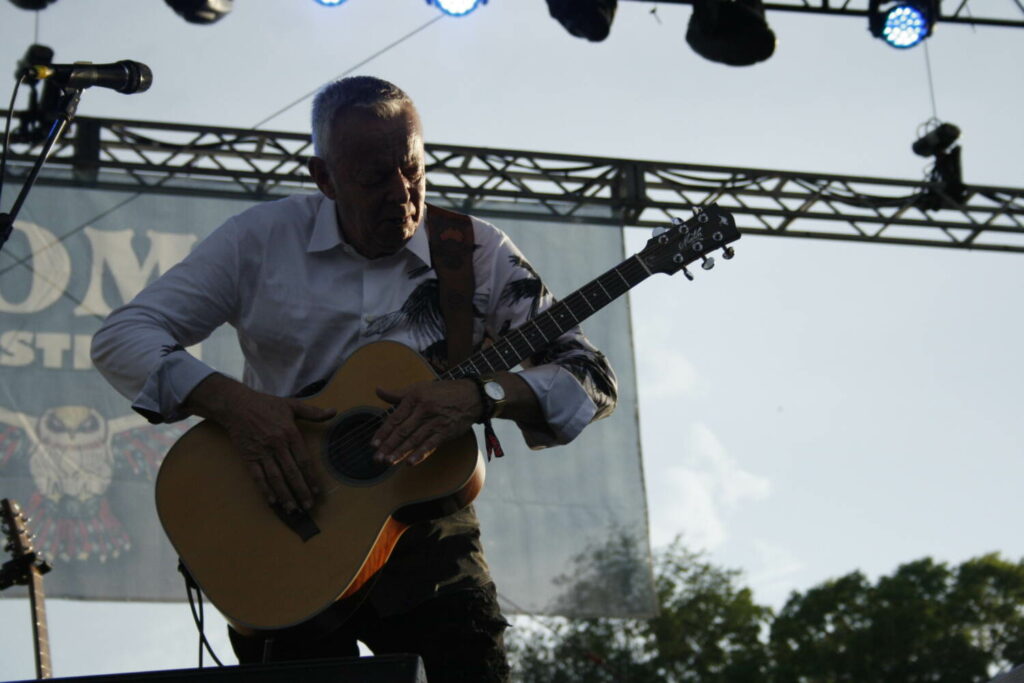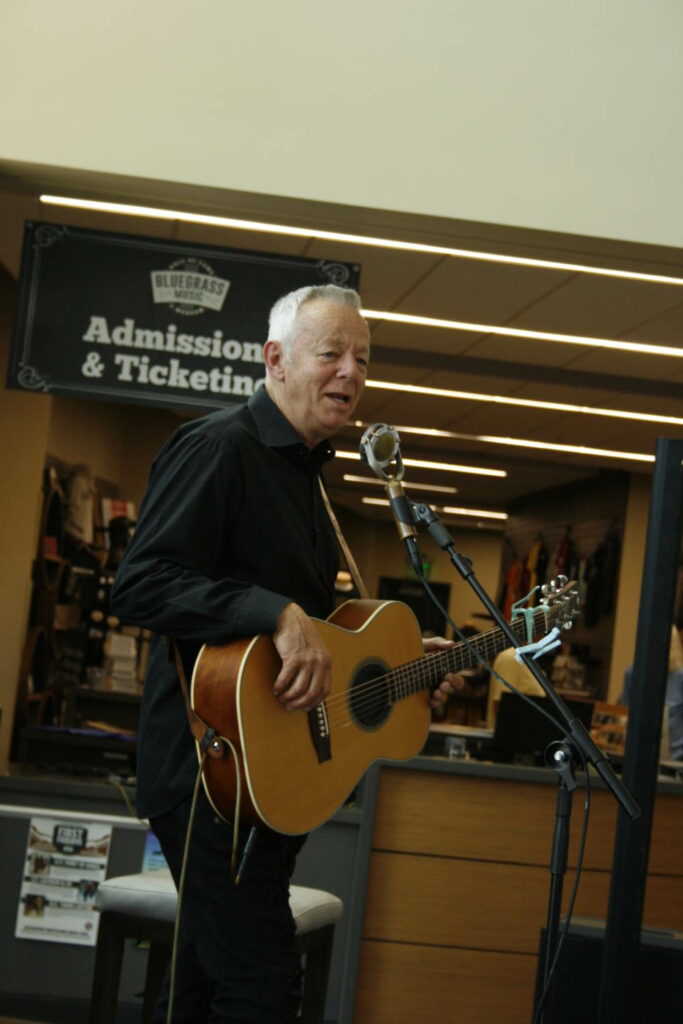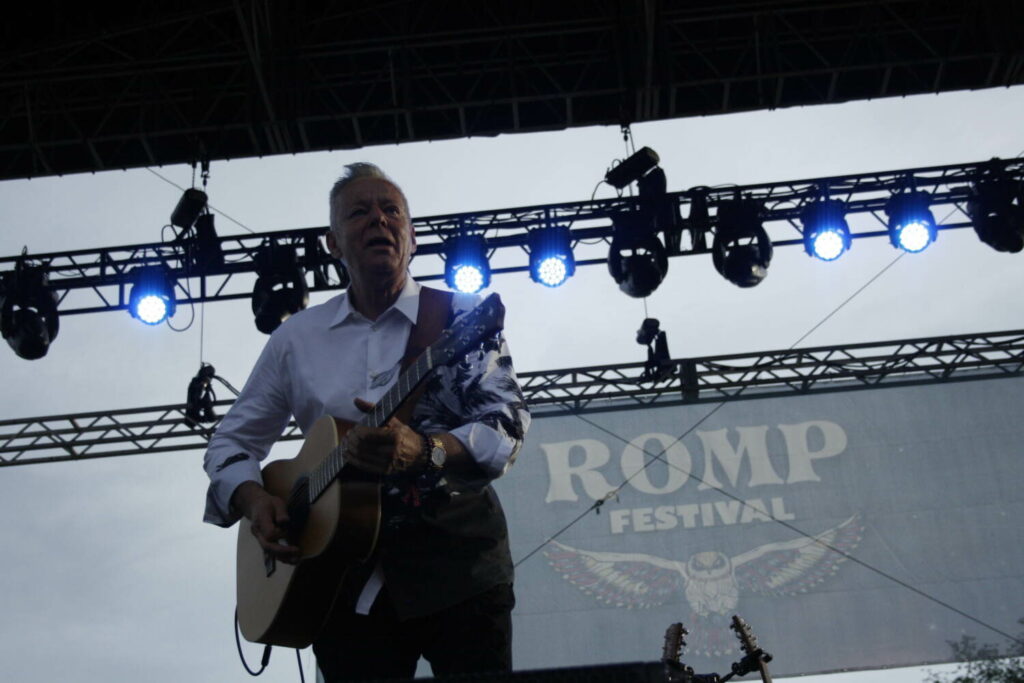Hey AcoustiCult, I’m Ella Cope, the newest member of the AcoustiCult family. I’m excited to share this interview I conducted with legendary guitarist Tommy Emmanuel before his set at ROMP 2022.
Ella: As always, at the start of interviews, please state your name and who you are and why you’re at ROMP.
Hello, I’m Tommy Emmanuel, and I’m a guitar player. I’m here for ROMP, and I’m playing tonight. This is Saturday night, right? I’m playing tonight, and a lot of my friends are on the show as well–Marty Stewart and Rob Ickes and Trey Hensley; Del McCoury. A lot of people that I really love and admire are playing here. It’s a great lineup. And I really love a chance to support the Bluegrass Hall of Fame here. It’s an important part of the musical heritage of American music. You know, it’s really, really important. So that’s why I’m here.
Ella: Absolutely. Well, thank you. So first of all, I picked out a word you said in your set: “Australiana”, which I enjoyed because I think a lot of people might classify your music as Americana music, or Roots music, right? You list your influences as like, Chet Atkins, and then you played a Merle Travis song, but also a Tennessee Ernie Ford song, right?
Tennessee Ernie Ford sang 16 Tons. That was written by Merle Travis.
Ella: Yeah, but you know, the version I know is Tennessee Ernie Ford. Anyway, so you list your influences as these American musicians so…
Well, some of my influences, right? I talked about those things because I’m playing today in the Bluegrass Hall of Fame, right?
Ella: I see, catering to the audience?
No, no, just, you know, I didn’t want to assume that it was okay for me to get up there and talk about Eric Clapton or The Beatles or whatever. Though, I don’t think people are so one-eyed or closed off about the influences of the other parts of the world. So, I’m an Australian who grew up listening to American and English and Australian music. And also, obviously, in pop music, there’s music that comes from Italy, comes from Germany, from Spain. I’ve listened to all kinds of music, but Bluegrass and Country is what’s really in my blood.
Ella: And that’s interesting to me, because (including jazz as well) those three genres are like the primary American developed genres of music. So yeah, I just wanted to ask about your perspective playing American music as a non-American. How did you get into it and why were you drawn to this culture, specifically, growing up outside of it?
Okay. Well, let’s go back to the early 60s. And I’m listening to Jimmy Rogers, Hank Williams, Hank Locklin, Hank Snow, Patsy Cline. And then, of course, Jim Reeves, Buddy Holly. And so there’s all that kind of music. And then the Beatles come along. And that’s all you hear on the radio, you know. But the first music that really moved me was Hank Williams and Jimmy Rogers. So that that’s what got me interested in music in the first place. And the other thing I want to tell you is that during the 60s, when I was a young guy, I used to go to bed at night reading the Fender catalog, because I couldn’t afford a Fender guitar or Fender amp–they were hard enough to find in Australia. But I would be sitting there looking at the catalog, looking at photos of Buck Owens and people like that playing his Fender, you know. “I want one of those guitars. Oh, look at that white Jaguar. Oh, look at that Fender Twin. Oh, look at that Telecaster.” You know, eventually I did get those things.
Ella: I was about to ask, did you become a collector?
Well, my Fenders served me well, and they still do. And of course, Chet Atkins…this is a thing about a guy like Chet Atkins: people don’t realize in this generation, that in the 60s, he was the name on everyone’s lips. People are like; “Have you heard this guy Chet Atkins?” And it’s like, oh God, who is that good? No one’s that good. It’s got to be a recording trick. And his record sounded so amazing. His ideas were brilliant, you know, and so he was a big influence…So all that stuff was an important part of my growing up in and being influenced by American music and American culture. And so in the early 70s, I bought a Pontiac so I could own an American car. And it was a great car.
Ella: We had an old Pontiac, we loved that thing.
Yeah, it was a good car. And I’ve owned a Chev, I’ve owned a Pontiac, I’ve driven a DeSoto…a long, long time ago…The thing is, anything made in America, in the 60s, was the best in the world. There’s no doubt about that. And it still is when when people do it right, you know?
Ella: Yeah. So as I understand, you started playing at a very young age.
Yeah, when I was four.
Ella: So one thing I’ve been asking folks that I’ve been interviewing at ROMP is: what is your earliest bluegrass memory? And if it’s not a bluegrass memory, maybe it’s a musical memory in general.

Well, I was listening to bluegrass, I just didn’t know it was bluegrass–I thought it was country music. If you put on, you know, Merle Haggard in the early days, it sounds like Americana now, but what it is, is country music before it got taken into the rock and roll stadiums. Yeah. And I love all kinds of music. But I think some of my earliest memories of listening to music that was bluegrass style was Bill Monroe and Flatt and Scruggs. You know, I’d have to say Flatt and Scruggs, more than anybody, because they were on TV. The Beverly Hillbillies was on and you could see them. And every now and again, at a film–like, there was a film came to Australia and it was called “Country Music on Broadway”. And it started out with Vassar Clements playing the violin up close, and it was playing this beautiful music. And then there was Hank Snow and people like that. And Wanda Jackson, and Connie Smith, Tom T. Hall, Leroy Van Dyck. I mean, just so many people. And I remember all that, that period, you know? It was just really, really beautiful. I think one of my favorite bluegrass records still to this day is Ricky Skaggs and Tony Rice together (Skaggs and Rice, 1993). It’s a true masterpiece.
Ella: Completely agree. The first bluegrass musician that I heard other than my family was Tony Rice, right? And he is such an influence on me, as a person, as a musician. So yeah, that that very much hits me where I live, the Ricky Skaggs and Tony Rice album.
Skaggs–I just loved his choices of songs, the way he sang. That voice he has is just out of this world. It’s so gorgeous. I remember when Alison Krauss came over to my house, and we were working on a song together. And I played her this new song that I just recorded, where Ricky was singing. And she got tears in her eyes when she heard him sing. And she said: “Oh, that voice”. You know, it’s such a part of our life. It’s the same as when I hear Hank Williams or when I hear Merle Haggard. There are certain songs that I can’t listen to without crying because they touch me in a place that only they can. And that’s the heart and soul of this music. It’s beautiful.
Ella: Yeah. Ricky Skaggs has a really perfect example of a Bluegrass vocal style. Like, if you want to study the Bluegrass vocal style, listen to him, listen to Ralph Stanley, right? So speaking of a flat picker, speaking of Tony Rice–you’ve obviously developed a very distinctive personal style in your playing. And it’s percussive, and it’s precise and dynamically really interesting.
Thank you.
Ella: Of course! So I wondered: if you grew up listening to these country artists–who were fantastic musicians, but who weren’t really doing the type of harmonics that you were doing today, weren’t really doing interesting time signatures and phrasing. How did you develop that more progressive style?
I think that was just the influence of movie music, [and] of listening to other styles of music…When I wrote the song Fuel, which you may have picked up on, had some interesting time things–all I was trying to do with that was be adventurous and write something that would take the place of Classical Gas. Because since 1969, you get out a guitar, and someone will say: “Do you play Classical Gas?” I still love the song, and I know the guy who wrote it: Mason Williams. But I tried to write something that was from me, and that could challenge that piece of music. So, the funny thing about the time signatures in that song: I’m not adept at playing in odd times. If you watch my foot when I’m playing the song, I tap time right through every change, and the time doesn’t move. It’s the time signatures that that move. So you can tap time right through it. But it’s interesting, because my style has developed–and you’re one of the first people who’s picked up on this–that my style…you can trace it right back to Ike Everly, Moes Rega, Merle Travis, Chet Atkins, Jerry Reed–but there’s all this other stuff going on. [There’s] movie music, there’s jazz, there’s country, there’s rock and roll, there’s blues.
Ella: I’m even thinking of classical guitar, like Spanish guitar. There’s for sure elements of that.
Yeah. So it’s just, I don’t know. It’s just my sound, thank heavens.
Ella: It’s a good one.
Thank you. Well, it’s still a work in progress. And I really hope that I get better over the years. I practice a lot, and I’m always looking for something new to play, trying to keep it interesting for my audience and for myself. I’m constantly wanting to be challenged. And I floor it when I go on stage, I don’t hold anything back. And you got to do that. And that’s why we love people like Del McCoury…people like that, because those guys are pouring their hearts out. They’re coming from deep in their soul. And that’s what makes people enjoy it so much. You know, I would have to say, the person with the most charisma I’ve ever seen in my life was Johnny Cash.
Ella: Yeah, that would track. But it’s interesting because he wasn’t a spectacularly showy performer, nor had any schtick really at all, like so many of the artists of that era. But I appreciate your comment that like, the raw charisma…
Yeah, his charisma was, it was jaw dropping. I had never witnessed it before. In ’95, I saw him at a big place. And he was with the Highwaymen. And he was last to come on. And when he walked on stage, the crowd erupting was like nothing I’ve ever seen in my life, the way that people were falling down on their knees, wailing and crying. Women were almost fainting, and tears came to my eyes and I didn’t even know why. He just stood there and did nothing but just stand there. And then eventually, the crowd composed itself. And he got up to the microphone and he went: “Mmmm [low hum]”. It just–it went through you like a bolt of lightning! And he didn’t say anything, he just went “Mmmm”– he took my breath away! And then the roar came up from the crowd again; we had to wait for that to go down. And then he went: “Get rhythm / when you get the blues”. Oh my God, I thought my heart was gonna explode. How do you explain that to somebody? What the hell is it?

Ella: That one man can get on stage and sing three words and have a crowd falling over themselves?
What’s he doing? He’s not doing anything. What he’s doing is being a channel. He’s a channel for something much bigger than us. Whatever that is–I can’t tell you what it is. But there’s something much bigger than us going on. We’re just the vehicle sometimes if we’re lucky. So I try to keep my channel open waiting for a bigger power than me to appear.
Ella: Lastly, what would you say to a beginning Bluegrass student like me?
Listen to all kinds of music, right? Learn all the good songs. Find all the really good songs and study from the greats and everything. But, at the moment, you can watch any video by Molly Tuttle, and it’ll be one of your greatest lessons in playing, singing, arranging [and] songwriting. She is incredibly adept at what she’s doing. And she has my absolute respect in every way. Her and Sierra Hull are as good as bluegrass music has ever been. So, yeah, just learn all the good songs and then get out there and don’t hold anything back when it’s your turn. And if you play music from deep in your heart for people, they all know it, and all they’re going to want to know is: when are you coming back? That’s what you need. People are always saying to me: “What do you think about reviews and critics and blah, blah…”, I say: “I don’t care about any of that shit”. What I care about is the person who comes up to me and says: “When are you coming back?” That’s what I want to hear. You know, because a man needs a good job.
Ella: It is a living after all! *chuckles*
It’s the best. Yeah, I play for free. I just get paid well to travel.
Ella: Hmm, the long con.
*both laugh*
Ella: Thank you so much for talking to me. It’s been a real joy.
Thanks for your really interesting questions, and I look forward to buying your new album.
Ella: Oh, thank you. Yeah, coming out in 2035.
For more information on Tommy Emmanuel, check out his website and Instagram profile. Photos by Ella Cope.

